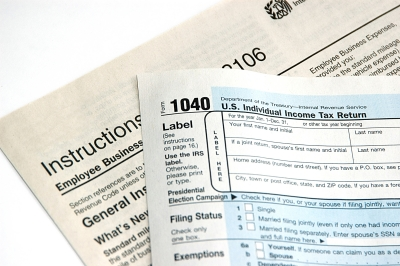If you own and operate a retail business, you might consider hiring seasonal employees to help you get through the shopping rushes in the summer and around the holidays. The good thing about using seasonal help is that you can get the assistance of a full-time employee without having to make the long-term commitment.
Tax Tips For Hiring Seasonal Workers
How to Estimate Your IRS Tax Penalties
The IRS takes a very strict stance toward taxpayers who fail to file their tax returns on time or pay their tax liability in a timely manner. Depending on the situation, a taxpayer who fails to file and pay promptly can end up owing both penalties and interest, in addition to the original amount due. Before you consider holding out on making your tax payment, it's good to find out about the potential penalties for late filing and payment. If you learn how to estimate tax penalties, you'll be able to guess how much you have to set aside to clear up your account.
IRS Tax Tips for Nonprofit Organizations
Are you the administrator of a qualified nonprofit organization? Since these organizations are often exempt from taxation by the IRS, you might mistakenly fail to file an annual tax return with the government because you thought you didn't need to file your taxes. While it's true that your nonprofit may not have to pay taxes, your group may still be obligated to provide certain information to the IRS annually.
The Taxpayer’s Guide to Calculating Taxable Investment Income
Have you heard the term "investment income"? Do you know what it means? If you're an American citizen who has money in an interest-earning bank account, mutual fund, or stock, you need to know about your personal investment income and whether it's taxable. If it is, you'll have to calculate the appropriate tax rate and include it in your taxable income for the year. Since tax rates for investment income can fluctuate, understanding how different types of investment earnings are calculated is critical to complying with IRS regulations.
10 Most Common Questions about IRS Tax Audits
The prospect of an IRS audit is enough to frighten any American taxpayer. An audit is a lengthy, investigative process that examines every aspect of your financial history for the tax year in question. According to the findings, you may owe additional taxes, penalties and interest to the IRS. Here are 10 frequently asked questions about IRS audits.
If you're a small business owner who is looking to hire on a few workers, you may be searching for ways to reduce your payroll budget. It's no secret that hiring employees can be costly, especially considering employers are responsible for paying federal payroll taxes, unemployment taxes, and health benefits. Some companies have used a workaround by hiring independent contractors or temporary employees, rather than full-time employees, to their workforce. While it may seem that independent contractors and temporary workers are interchangeable, they are not. The two statuses are very different, and they should be treated differently by business owners.
IRS Tax Documents: What to Keep and How Long
Some taxpayers might feel that they don't need to keep their income tax documents unless they have particularly complex tax situations. The reality is that all taxpayers should keep their essential tax documents on file. Depending on your circumstances, you may need to keep your records for several years, in case of an audit or to back up a claim.
Tax Advice for Temporary and Seasonal Employees
Seasonal employees are workers who take jobs that only last for a few weeks or a couple of months during a specific season. Most commonly, these employees are hired on to give a business additional help during a busy period such as the summer season or the retail holiday season. In many cases, seasonal employees are students who work during school breaks or adults who are supplementing their full-time pay with part-time work. No matter their individual situations, it's important for seasonal employees to understand their tax implications so that they can avoid paying tax penalties with their returns.
How Does the Adoption Tax Credit Affect Your Tax Payments?
When an individual or a family considers adopting a child, one of the biggest concerns is the high cost of the adoption process. Prospective parents often have to spend large amounts of money before they ever see their potential child. In addition, they may be left with unpaid bills, even if the adoption is ultimately unsuccessful. The federal government initially approved an Adoption Tax Credit in the mid-1990s that would ease the financial burden on an adopting family. Taxpayers who take advantage of the provision can reduce their tax liability for the year.
What is a Declaration Control Number?
Since the IRS released the electronic filing, or e-filing, method for submitting federal income tax returns, the popularity of the practice has grown considerably. In fact, the agency is now encouraging as many taxpayers as possible to file electronically to cut down on the amount of paperwork involved in the process and to speed up the turnaround time for refunds. Declaration Control Numbers (DCNs) were originally a vital part of e-filing, serving as an electronic method of identifying returns, but the IRS has since discontinued use of them in favor of a streamlined e-filing process.
SUBSCRIBE VIA EMAIL
POSTS BY TOPIC
- Tax Tips and Help (285)
- IRS Collections (121)
- IRS Audit (72)
- Tax Credits and Deductions (70)
- Tax Resolution (62)
- Business Taxes (54)
- Back Taxes (48)
- Wage Garnishment (21)
- Tax Levies (19)
- IRS Payment Plans (15)
- Tax Liens (14)
- Offer in Compromise (9)
- Unfiled Tax Returns (9)
- IRS Tax Attorneys (7)
- Asset Seizure (6)
- Tax Evasion (6)
- Criminal Tax Defense (4)
- Innocent Spouse Relief (4)
- Alimony (1)











